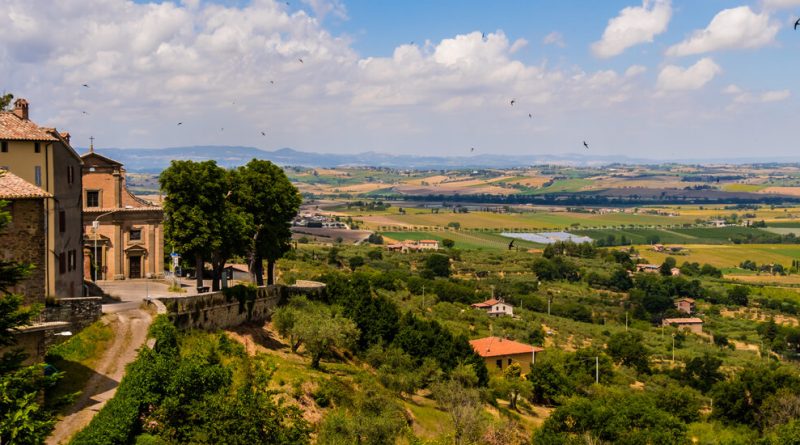Quiet Reflections on the Enchanting Italian Village of Panicale
[ad_1]
At the onset of the coronavirus pandemic, with travel restrictions in place worldwide, we launched a new series — The World Through a Lens — in which photojournalists help transport you, virtually, to some of our planet’s most beautiful and intriguing places. This week, Barry L. Schwartz shares a collection of images from the central Italian region of Umbria.
In 2017, a few months after we got married, my wife, Maggie, and I took a six-week trip — part honeymoon, part yearslong delayed vacation. Leaving California, our first stop was in Brooklyn to see Maggie’s oldest friend, who we all knew was not going to survive a cancer that had returned after many years. It was a good visit.
Next, we flew to Barcelona and drove to a small coastal town, Sitges. While there, I learned that one my oldest friends had just died, also from cancer, also at the end of a series of treatments.
A few days later we flew to Florence, driving a few hours south to Panicale, a small hilltop town in Umbria. A friend — Steve Siegelman, a food writer in California — had lent us his renovated brick-and-stone rowhouse in what he jokingly refers to as the “new neighborhood,” because it was built in the 1500s, while the town’s main center, the piazza, dates back to the 10th century.
Steve had discovered Panicale on a trip with his parents years before. Rural hilltop towns all over Europe have been emptying out for decades as people move away to make a living, leaving houses to be bought by Americans, Britons and Germans as primary or second homes. They, along with the locals, help keep Panicale alive.
Early on, we badly needed to do our laundry. The washing machine in the basement could not be convinced to do the job, resulting in texts to Steve in California asking whom to call for help. He wrote back that his local fixer would get a plumber over at some point; in the meantime, he put us in contact with an expat couple, dear friends of his, Elida and Guenter, a half-mile away, with an olive grove and a brick house overlooking a valley. They immediately invited us to come for a meal and to use their laundry machines, which were set into a hillside like a wine cellar.
Steve supplies his guests with a 21-page manual: how the house works, where to go, whom to call for advice and help. At the time, there were three grocers in town, and we were instructed to buy from each, as everyone in town did, partly to keep them in business and partly because everyone is so nice. (Iolanda’s had great fresh fruits and vegetables.)
Unlike Maggie, I had never been to Italy. Raised in Los Angeles, I’ve had a lifelong obsession with authenticity, an elusive quality in my hometown. It was a balm to find cobblestone streets and peeling plaster walls that were not aged by artificial means, and to buy ordinary fruits and vegetables, not “heirlooms.”
One place in particular I documented at all times of the day: a spot where four streets converged at a short wall, below which sat a garden. The wall provided an overlook to the agricultural plain to the north — toward the town of Castiglione del Lago, on Lake Trasimeno. A few days after arriving, we were invited by friends of Elida and Guenter to a meal in that garden; arriving, I was a little thrilled to realize I had photographed their garden wall and front door many times.
Aldo Gallo and his wife, Daniela, own Bar Gallo, the most likely of all places on the piazza to be open early and late. Their son, Simone, and his wife, Lorena, have a restaurant across the way. There are several others places to eat off the piazza, too, and they are all good. Aldo made us feel welcome from our first day to our last.
Steve suggested we take an official tour of the town. When we did, we had the guide to ourselves: a young Italian woman in a graduate art history program who gave tours as a summer job.
We walked first to a 200-seat proscenium theater, Teatro Caporali, built in 1786 by 12 families; each had a box. Maggie, a costume designer, was thrilled. The theater is still used by local and touring performers.
We walked to another church, Madonna della Sbarra, the columns of which are painted to look like marble. The ceiling, a beehive grid, was also trompe l’oeil; I had to look hard to see it was smooth plaster. The alter was intricately carved and multihued, its paint still bright.
Upstairs was a small museum with a few paintings, and behind glass in the old hermitages were an assortment of artifacts: a Bible, censers, goblets, well-preserved silk vestments.
Maggie and I married in middle age, the first marriage for both of us. In the years preceding our wedding, we each buried our mothers, other relatives, a few friends. Not unusual at our age. Our ill friends were part of the inspiration for the trip; while we remained healthy and ambulatory, it was time to take our version of a Grand Tour.
In that way, wandering around a thousand-year-old town was instructive. Beyond the too-obvious metaphor of surviving well into old age, there remained a lot of life and beauty in the old stone walls, in the people we met, in the sky above the plain, which stretched — crowded with farms — to the horizon.
